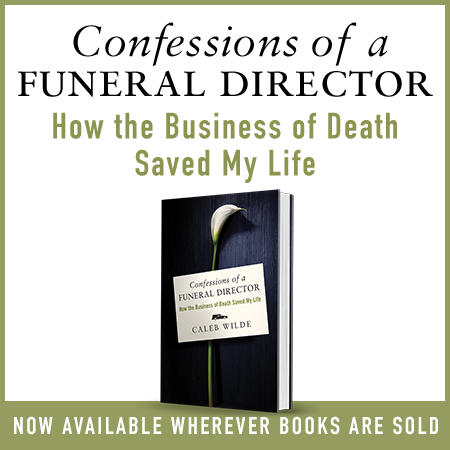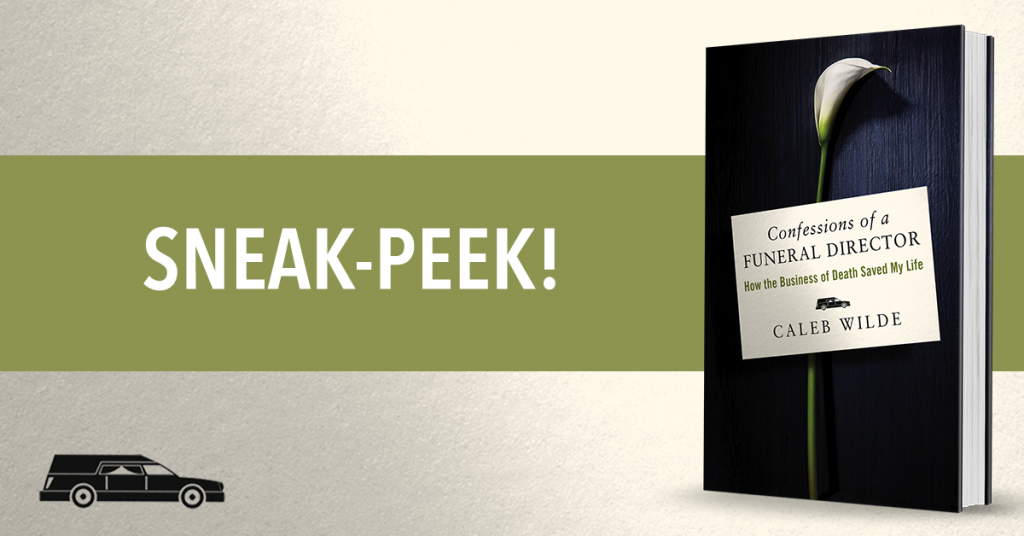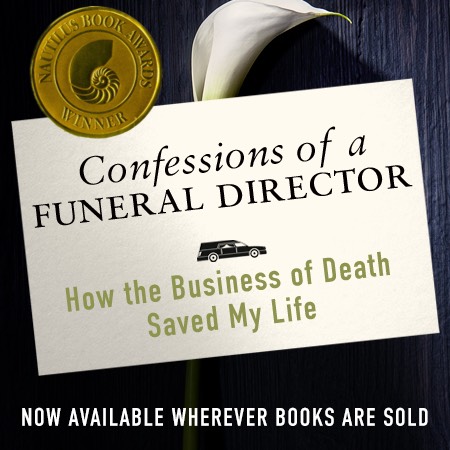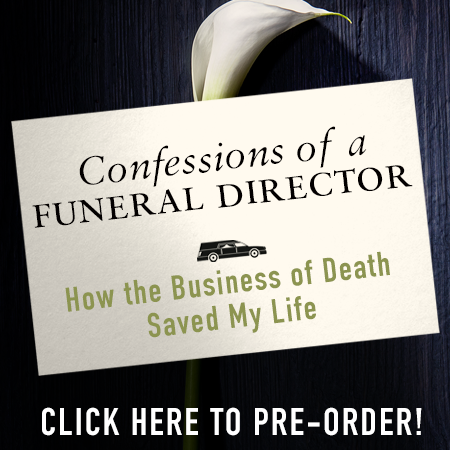Caleb Wilde
(218 comments, 980 posts)
Posts by Caleb Wilde
10 Things Funeral Directors Hate
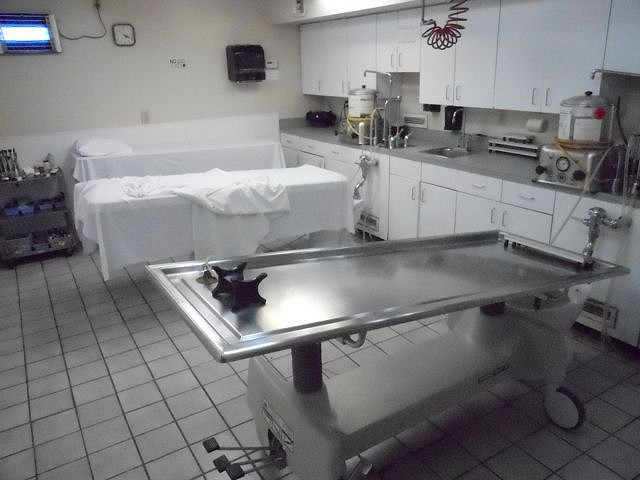
Photographer URL: https://www.flickr.com/people/63239698@N05/
Title: Autopsy Table
Some of these 10 things are things that I hate. Some are things that are universally hated (i.e. tissue gas) by those of us in funeral homes. While others are things that industry funeral directors love to hate (and when I use the term “industry funeral director” I’m talking about the sycophantic, uptight company men and women of “the industry”).
One. Tissue Gas:
I’m not sure if “hatred” is a strong enough word for how we feel about tissue gas (aka Clostridium perfringens). It usually ruins a body, it can sometimes run the other bodies in the morgue, and it can even ruin future bodies that come into our morgue. Tissue gas results from an organism that duplicates itself every six minutes, causing a normal dead body to totally change in a matter of hours. Tissue gas is so contagious that if it gets on our embalming instruments, it will spread to the other bodies. It’s like the movie Outbreak but in a morgue. And once it takes over, we pray for a cure, but that prayer is rarely answered.
Two. The Heroin Epidemic:
I wrote about this hatred early last week. Here’s the link if you want to read about how much I absolutely HATE heroin.
Three. Medical Examiners that Short Cut Arteries
Grrr. Just a little bit of generosity with your cuts! We’re not trimming weeds, or plucking eyebrows here. You don’t have to make those arteries as short as possible. Give us something to work with so we can embalm your autopsied body.
Four. Accidently Slicing a Vein while Raising the Carotid and Jugular:
There’s nothing that I hate more than accidentally nicking an artery or vein when I’m raising the carotid artery or jugular vein. It’s hard enough to raise the carotid and the jugular without blood seeping up from the netherworld of the neck and having to fish around blindly in the red and sinew to find what you’re looking for.
Five. Cheats:
More and more funeral homes are expecting payment up front. There’s reason for this up-front payment policy. We’ve been beaten by past clients on numerous occasions. We’ve been beaten by families who come in and say, “We have a $30,000 life insurance policy, and we only want the best. Because Dad deserves the best.” They sweet talk us, swindle us, they buy our best casket, purchase a couple plots “for the whole family” at the cemetery, they buy the best vault, write a huge obituary and put it in five different newspapers. Two months and $16,000 later and we see the family driving around town in new cars, having used all that $30,000 and bounced on the $16,000 funeral bill.
Obviously, we hate being cheated, but we also hate the broken trust.
Six. Corpse Vomit:
AHHHHH. There have been a couple times when I’ve gotten turned around on a removal and gone down the stairs with the deceased’s head facing down. If there are any remains of yesterday’s lunch, there’s a good chance that lunch is gonna come seeping out of their mouth and onto us. There are few things that are more deserving of a “Dirty Jobs” episode than handling vomiting corpses.
Seven. Casketed Purges:
This falls into the “so annoying, I hate it” category. You can aspirate all the cavities multiple times and still, on the very day of the viewing, the deceased decides to leak a little purge out of their mouth and onto the casket pillow. Grrr.
Eight. Bad Funeral Directors:
There’s nothing industry funeral directors love to hate more than “funeral directors who give the industry a bad name”. Funeral directors too often suffer from enlarged egos and self-aggrandized views of their own ethical standards, so when someone in the industry messes up, we love to hate them so we can feel distinguished from the bad guys. The bad guys act like the scapegoats to cover our own sins, hiding the fact that most of us in the industry could do better for our customers.
Nine. Criticism:
Jessica Mitford caused a lot of butthurt in the funeral industry and here’s the short answer to “why”.
Families come to us in despair, their minds clouded by grief and the unknown. They pay us to be the stable minds. And they give us power. They give us power every time they trust us with their deceased loved one and their grief. And when they give us that power, there’s a certain satisfaction that comes with treating that vulnerability with as much honor as we can.
But sometimes that power can bloat our egos. And bloated egos absolutely abhor criticism, even when it was warranted like Mitford’s.
Ten. Funeral Directors that are Transparent
Industry funeral directors often have invisible standards of “professionalism” and anyone that falls outside those standards is a “POS” or “bitch” (terms that I’ve been called on a couple occasions by the industry yard barkers). Anytime funeral directors write about our work with a degree of transparency and honesty, that stirs the feathers of the industry funeral directors.
In fact, I fully expect my book will do just that. If you want an insider perspective on the industry that’s equal parts personal, honest and transparent, buy my words:
Free Chapter of My Book Exclusively for You
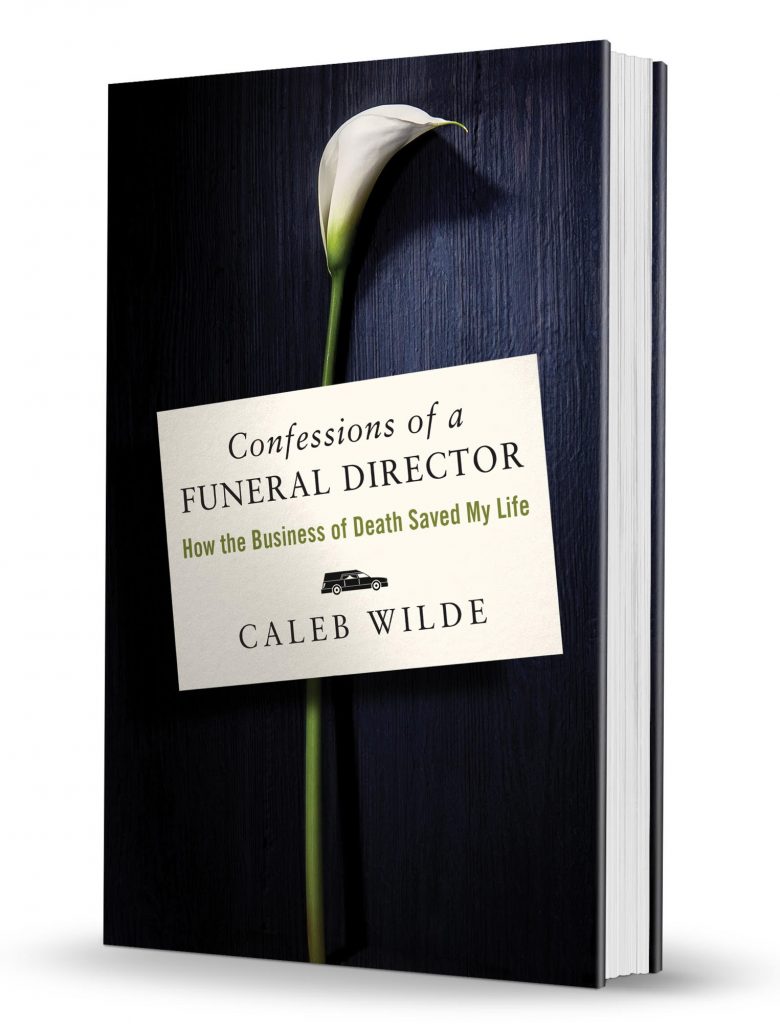
Ideas have consequences, but narratives shape our world. When it comes to death, our narratives are generally woven with denial, negativity, and anything that can distract us from our mortality.
I believe death harbors sacred spaces that enable us to find our true selves and true community. This narrative that there’s good in death, this story is the story of my book. And I’m excited to share a piece of that story with you today.
If you’ve been reading my blog for a while, you might have seen pieces of this story over the years. While most of my book is original, this story bears repeating because it captures a narrative about death that we so desperately need.
Enjoy this sneak-peek of my book ![]() Love you all.
Love you all.
Click the picture below and it will take you to the free chapter:
Three Stories of Funeral Drama

Author: pedro alves
Author URL: https://www.flickr.com/people/sevlaordep/
Funerals are the perfect storm for drama. Death brings out all sorts of emotions and because we’re not used to emotions like grief, it’s more difficult to control our emotions as a whole. You might say things that they’ve been thinking for years, like telling your brother, “You’re so rich, YOU should pay for dad’s funeral bill” or “I was always Mom’s favorite so I get to make these decisions.”
If a soap opera really wanted to create a ripe context for daytime television, they’d write a show for a funeral home and call it “General Funeral Home” or “Days of Our Deaths” or “The Dead and the Rest in Peace”. Here are three stories of funeral drama that I’ve seen:
The Drunk: Some people see funerals as a stage, a stage where they can shine. I probably have a hundred attention grabber stories, but one star stands out brighter than them all. A couple years ago, we buried a man in his sixties who had little life connections except a couple friends and a couple sisters. The family decided to have a graveside service at a small cemetery on top of a little hill in a neighboring town.
All was going well until some friends showed up at the graveside service with a drunk in the back seat. The drunk got out of the car and we could tell things were about to get exciting. He sauntered out of his car and immediately started talking in a loud voice about how the deceased was his blood brother. He quickly qualified that with, “he was also an asshole”. At first, the deceased’s sisters snickered at the drunk, but once the preacher began and the drunk was trying to get his words in the sister’s told the drunk to “just shut up.”
Loud mouth drunks are no fun at funerals, especially when we have to play bouncer and try to corral them. I was really relieved when the sisters’ “just shut up” actually worked and the drunk quieted down as the preacher finished his message. But the drunk ended the show with a crescendo. When everyone else was putting a flower on the casket, the drunk picked up a handful of dirt, threw it at the casket and said with a laugh, “take that you lovely SOB.” After that, he walked away, got in the car and his show was over.
The Thief: We got the death call from the eldest son, who had driven all the way from Montana in his big dualie truck the week before in anticipation of his father’s death.
“What time do you want to come in to make funeral arrangements?” I asked.
“Well, that’s not so easy to determine,” he said in a slow and steady voice. “See, my younger brother and I don’t talk much. I’m gonna give you his phone number, you can call him and whatever time he wants will work for me.”
Red flags went up immediately for me. It’s always a danger when funeral directors become the mediators between fighting family factions.
I called the younger brother, set a time and then called back the older brother. A couple hours later they were sitting at the funeral home across from each other, neither one willing to talk to the other one. They’d talk to the other through me by saying something like this, “If he wants that casket, I’m okay with it.” And the other would look at me and say, “Well, if he’s okay with it, this will be dad’s casket.” The whole process was laborious, childish and taxing on me as I played both mediator and funeral director.
The day of the funeral, the younger brother showed up about a half hour before the viewing just like we had planned. But the older brother was nowhere to be found. We really didn’t think anything of it. It’s not like the older brother HAD to be there a half hour before the public viewing. But an hour later and he still wasn’t at the funeral and we started to wonder where he might be. Those questions were quickly answered as we saw his truck coming down Main Street to the funeral home. But as it got closer, we noticed it was pulling a trailer behind it with a Harley-Davidson Motorcycle, a zero-turn mower, a tool chest and some other valuables. He stopped in front of the funeral home, rolled down his window and said, “Go get my brother.” As soon as his brother walked out the funeral home, the older brothers started to drive off, honking his horn. The young brother opened his mouth and started yelling, “That’s all Dad’s stuff! You’re taking all his stuff!”
The Drama Daughter: Let me make this clear from the beginning: if the way you express your grief is through drama, that’s okay, just so it’s not mean drama where you’re messing up everyone else’s grief. What you’re about to read is likely healthy drama, but it was nevertheless difficult for us as funeral directors to navigate being that I’m not Dr. Phil.
A couple years ago we dealt with some very, very dramatic grief. We went on a house call, and the two sons and one of the daughters of their deceased mother came out to meet us. This is normal and we didn’t think anything of it, but as they came closer to us their faces were a mixture of grief and perplexity.
“We have a problem,” they told us, “our sister is absolutely set on the idea that she doesn’t want mom to leave the house.”
“That’s fine”, we responded. “We can come back when she’s ready for us.”
“See, the problem is that we don’t think she’ll ever be ready for that. She’s been with mom’s body for the past nine hours and she’s set on staying, and we don’t want her to.”
And here’s where things got messy: three of the deceased’s kids wanted us to take mom back to the funeral home, but one wanted to stay exactly where she was.
They asked us if we had any suggestions and we told them that we could come back tomorrow and see if she changed her mind. But they were adamant, “You don’t know our sister. This needs to happen now”
We followed them into the house and into the room where their mother lay. When the sister saw us, her eyes shot daggers our way. After a half hour of her siblings comforting her, they finally got her to release her grip on their mom. We went in to make our move, and she ran and threw herself on top of her mom like an angry dog protecting her puppies. So, like one would do if you saw an angry dog, we slinked back away.
Another half and hour rolled past and this time her siblings got her to move to another room. We made our move, put the deceased on our stretcher, loaded her into our removal van, and as we started the car and put it in Drive, we saw the front door swing open. What happened next still leaves me feeling uncomfortable to this day.
The door opened and out flew the drama daughter, who was being closely followed by her three siblings. She must have heard the van start, realized what was happening and made a quick dash to catch us. We looked in the rear view mirror and saw the three children waving their arms, telling us to keep going, while the other daughter chased after us, screaming “bring back my momma!” Three of the children were telling us to go, so we did.
The following day they all came into the funeral home to make arrangements and everybody, including the drama daughter, seemed okay. It was a new day for them and everyone was ready to move on.
If you like my stories, here’s a book full of them:
An open letter to Heroin from a funeral director
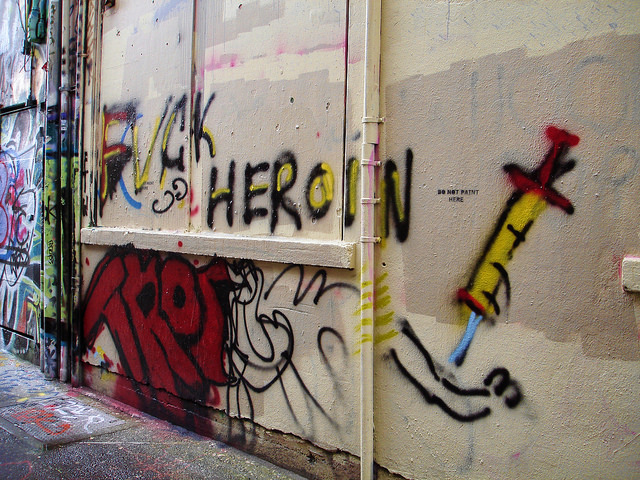
Photograph Author URL: https://www.flickr.com/people/raschau/
Title: Fuck Heroin
Fuck Heroin. FUCK. IT.
That’s what I want to say when I get a phone call from a crying son, daughter, husband, wife, girlfriend, or boyfriend telling me their loved one has died from an overdose. But I don’t say that. I don’t say it because it’s impolite and I’m supposed to be the even minded professional to your grief clouded bereavement.
But, “I’m sorry for your loss” and “my deepest condolences” just don’t work when a 19-year-old daughter was found in the basement of her friend’s house after two stints in rehab and five months clean. This was supposed to be the beginning of her life, not the horrible end.
Or, what do I say to the sixteen-year-old son who wants me to call him as soon as I get his mom to the funeral home because “that will be the first time in my life that I’ll know exactly where she’s at”.
Or, what do I say to the 30-year-old wife with three kids and no income, little support and now she has no husband.
Fuck it. FUCK HEROIN. That’s what I want to say.
How about the parents who tell me, “I’m glad it’s over. I haven’t slept in years, but last night I actually slept because I knew he wasn’t out hurting himself or someone else.”
Or the parents who tell me with blank expressions that they had absolutely no idea their daughter was using. That she was excelling in college, holding a steady relationship with her boyfriend, working part-time and now she’s on our morgue table.
What do I say to the young husband who tells me, “We don’t have any money for a funeral, she blew our savings and her life on this relapse.”
How do I respond when that very same young husband follows it up with, “how do I explain this to my kids?”
And then there are the times when the body has been left somewhere, abandoned by so called friends, and it’s starting to decompose. “Can I just see my dad one more time?” the young man asks. “Yes, you can,” I say, “but this doesn’t look like the man you expect to see.” The son replies, “That’s fine. I haven’t seen him in five years so I don’t have any expectations.”
FUCK HEROIN. I’m getting tired of these stories. I’m tired of unstitching and embalming autopsied bodies that are discolored and broken down by addiction. I’m tired of hearing the empty cries of “My, baby, my baby! How did this happen?” How did we get here?” when the mother sees her son in a casket. I’m tired of children asking, “what happened to mommy?” and “when will she wake up?” at funerals.
I’m getting tired of these stories. I know addiction is a disease. I understand that shame is never the path to healing. There’s no shame here towards the addict. The enemy is very clear. We can all agree that this particular disease, this particular addiction is worthy of our most harsh, most striking, most caustic curse words we can find.
For all the fatherless and motherless children I’ve served …
For all the widows and widowers I’ve walked with through the valley …
For all the bereaved parents now childless …
For all the individual lives you’ve stolen, all the futures you’ve killed, and all the love you’ve grieved …
I raise my middle finger to you, heroin.
Fuck you.
via GIPHY
*****
If you like my writing, consider buying my 2017 Nautilus Book Award Gold Winner, Confession of a Funeral Director (click the image to go to the Amazon page):
